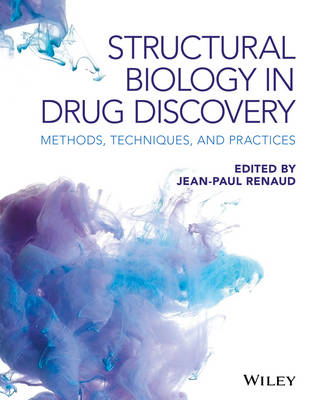
Structural Biology in Drug Discovery
John Wiley & Sons Inc (Verlag)
978-1-118-68101-5 (ISBN)
With the most comprehensive and up-to-date overview of structure-based drug discovery covering both experimental and computational approaches, Structural Biology in Drug Discovery: Methods, Techniques, and Practices describes principles, methods, applications, and emerging paradigms of structural biology as a tool for more efficient drug development. Coverage includes successful examples, academic and industry insights, novel concepts, and advances in a rapidly evolving field.
The combined chapters, by authors writing from the frontlines of structural biology and drug discovery, give readers a valuable reference and resource that:
Presents the benefits, limitations, and potentiality of major techniques in the field such as X-ray crystallography, NMR, neutron crystallography, cryo-EM, mass spectrometry and other biophysical techniques, and computational structural biology
Includes detailed chapters on druggability, allostery, complementary use of thermodynamic and kinetic information, and powerful approaches such as structural chemogenomics and fragment-based drug design
Emphasizes the need for the in-depth biophysical characterization of protein targets as well as of therapeutic proteins, and for a thorough quality assessment of experimental structures
Illustrates advances in the field of established therapeutic targets like kinases, serine proteinases, GPCRs, and epigenetic proteins, and of more challenging ones like protein-protein interactions and intrinsically disordered proteins
JEAN-PAUL RENAUD, PhD, is cofounder and President & Chief Scientific Officer at Urania Therapeutics (formerly RiboStruct), which focuses on rational drug design targeting the human ribosome. Previously, he was cofounder and Chief Scientific Officer at NovAliX and CNRS Research Director in the Structural Biology and Genomics Department at the Institute of Genetics and Molecular and Cellular Biology. Dr Renaud has over 30 years of research experience, along with 48 articles, 4 book chapters and 3 patents to his credit. He also initiated and is the Chairman and Scientific Organizer of the NovAliX Conferences "Biophysics in Drug Discovery".
List of Contributors
Preface
Chapter 01: The Evolving Role of Structural Biology in Drug Discovery
Chapter 02: A Structural View on Druggability: Experimental and Computational Approaches
Chapter 03: Structural Chemogenomics: Profiling Protein–Ligand Interactions in Polypharmacological Space
Chapter 04: Fragment-Based Ligand Discovery
Chapter 05: Combining Structural, Thermodynamic and Kinetic Information to Drive Hit-to-Lead Progression
Chapter 06: Allostery as Structure-Encoded Collective Dynamics: Significance in Drug Design
Chapter 07: Biophysical Assessment of Target Protein Quality in Structure-Based Drug discovery
Chapter 08: An Industrial Perspective on Protein-Ligand Complex Crystallization
Chapter 09: Membrane Protein Crystallization
Chapter 10: High-throughput Macromolecular Crystallography in Drug Discovery: Evolving in the Midst of Revolutions
Chapter 11: Assessment of Crystallographic Structure Quality and Protein – Ligand Complex Structure Validation
Chapter 12: Complementary Information from Neutron Crystallography Studies
Chapter 13: Determination of Protein Structure and Dynamics by NMR: State of the Art and Application to the Characterization of Biotherapeutics
Chapter 14: NMR Studies of Protein – Small Molecule Interactions for Drug Discovery
Chapter 15: Computational Structural Biology for Drug Discovery: Power and Limitations
Chapter 16: The Role of Structural Biology in Kinase Inhibitors Drug Discovery Success
Chapter 17: Serine Proteinases from the Blood Coagulation Cascade
Chapter 18: Epigenetic Proteins as Emerging Drug Targets
Chapter 19: Impact of Recently Determined Crystallographic Structures of GPCRs on Drug Discovery
Chapter 20: Targeting Protein–Protein Interactions Perspective
Chapter 21: Mass Spectrometry-Based Strategies for Therapeutic Antibodies Extensive Characterization and Optimization (OptimAbs)
Chapter 22: Integrating Evolution of Drug Resistance into Drug Discovery: Lessons from the Viral Proteases of HIV-1 and HCV
Chapter 23: A Comprehensive Review on Mycobacterium Tuberculosis Targets and Drug Development from a Structural Perspective
Chapter 24: Using Crystal Structures of Drug-Metabolizing Enzymes in Mechanism-Based Modeling for Drug Design
Chapter 25: Intrinsically Disordered Proteins (IDPs): Targets for the Future?
Chapter 26: Cryo-electron Microscopy as a Tool for Drug Discovery in the Context of Integrative Structural Biology
Chapter 27: Application of Hard-X-ray Free-electron Lasers for Static and Dynamic Processes in Structural Biology
| Erscheinungsdatum | 21.03.2020 |
|---|---|
| Verlagsort | New York |
| Sprache | englisch |
| Maße | 221 x 282 mm |
| Gewicht | 1724 g |
| Themenwelt | Medizin / Pharmazie ► Medizinische Fachgebiete ► Pharmakologie / Pharmakotherapie |
| Naturwissenschaften ► Biologie ► Genetik / Molekularbiologie | |
| Naturwissenschaften ► Chemie | |
| Naturwissenschaften ► Geowissenschaften ► Mineralogie / Paläontologie | |
| Naturwissenschaften ► Physik / Astronomie ► Atom- / Kern- / Molekularphysik | |
| Technik | |
| ISBN-10 | 1-118-68101-0 / 1118681010 |
| ISBN-13 | 978-1-118-68101-5 / 9781118681015 |
| Zustand | Neuware |
| Informationen gemäß Produktsicherheitsverordnung (GPSR) | |
| Haben Sie eine Frage zum Produkt? |
aus dem Bereich


